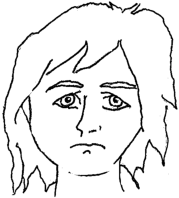

Module 5 - Mood Disorders
Depression
Depression is characterised by low mood, negative thoughts and also some physical symptoms usually called biological symptoms. Suicidal thoughts or behaviour are common. Mood is usually depressed or sad but people can also present with an irritable mood and increased aggression. Other symptoms may be reduced interest and pleasure in their favourite activities, withdrawal from social contact, reduced communication and changes in their usual ability to function. Other symptoms can include: • Loss of energy or increased lethargy; • Loss of confidence with anxiety or fearfulness, or increase in reassurance seeking behaviour; • Increased tearfulness; • Somatic and physical complaints; • Reduced ability to concentrate, distractibility or indecisiveness; • Increase in a specific problem behaviour; • Agitation or reduced activity levels; • Change in appetite or weight; • Sleep disturbance; and • Loss of skills. In other words, a person with depression will usually have been acting out of character for a few weeks in that they are bad tempered, unhappy or irritable. They may be argumentative and easily frustrated about things that would not normally bother them. Some people may be agitated, pacing and restless, unable to get to sleep and/or waking early in the morning. In addition they may not be hungry, may feel sick when they eat and may lose weight. Other people may feel sluggish, disinterested and spend a lot of time in bed. Overeating may provide some comfort and weight can increase due to lack of activity. There may be complaints about aches and pains or concerns about physical illness. In severe episodes of depression the full range of psychotic symptoms can occur The person may believe that they are bad, have done something wrong or should be punished. They can feel guilty and worthless. They may hear horrible voices calling them names, telling them bad things that they have done and what will happen to them. When the depression is severe the person’s thoughts may become extremely slow and this can affect how quickly they communicate and interact. They may have very few thoughts and think and speak very slowly. The person may come to believe that they have an incurable illness, are dying or are in fact already dead. Guilt, distress and hopelessness can lead to thoughts of death and suicide and may be associated with self-harm and attempts at suicide.














